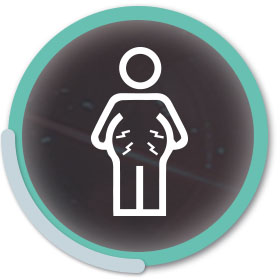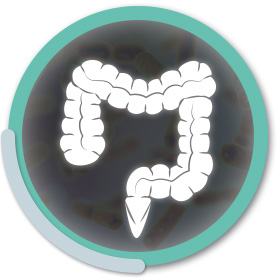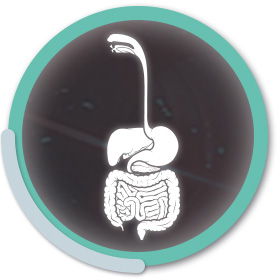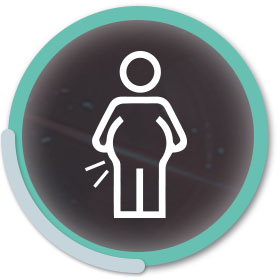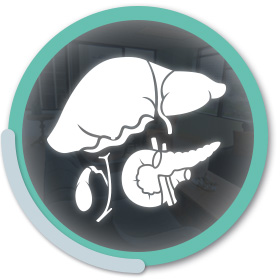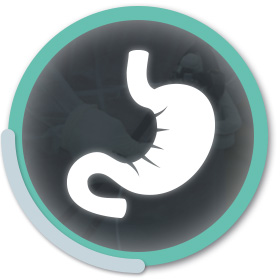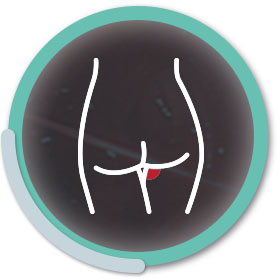Are you experiencing gastrointestinal issues and aren’t sure what’s wrong? Feeling symptoms with seemingly no explanation? The truth is that gastrointestinal conditions come in many forms, and some conditions can have overlapping symptoms, leaving you with unclear answers on what is actually afflicting you.
Here at Advanced Gastroenterology and Hepatology (AGH) of Greater Washington, we help diagnose various gastrointestinal diseases. We then offer exceptional care, quality, and comfort in our comprehensive digestive healthcare services.
Abdominal Bloating
Abdominal bloating is when your stomach feels swollen after eating. It is usually caused by excess gas production from carbonated drinks, menstruation, constipation, large meals, etc. With that being said, abdominal bloating can also be a symptom of other underlying causes (including some that are on this page).
Abdominal Pain
Abdominal pain is pain from inside the outer abdominal muscle wall. This pain can range from mild discomfort to severe pain requiring emergent care or surgery. Less severe abdominal pain can be caused by simple issues such as constipation, stress, overeating, or gas. If you are experiencing more excruciating pain, it is important to seek medical attention to ensure prolonged well-being.
Acid Reflux & GERD
Gastroesophageal reflux disease (GERD) or it’s more common name of Acid Reflux, is a digestive disease that affects nearly 3 million people in the United States each year. Stomach acid (known as bile) overflows out of the stomach into the lining of the digestive tract, irritating the food pipe. As a chronic disease, this lining is consistently irritated, leading to burning chest pains that can worsen when adjusting to a lying position.
Anemia
Anemia is another common condition in the United States. Anemia occurs when the body does not have enough healthy red blood cells. This can result from blood loss or dysfunctioning of the cells themselves. With a lack of healthy red blood cells, the body is not obtaining enough oxygen to help power the organs. People with anemia often experience fatigue, dizziness, and overall lack of strength. Anemia can also be a symptom of underlying causes, so it is important to visit a medical professional for any diagnosis.
Barrett’s Esophagus
Barrett’s esophagus is a condition that is usually experienced by people afflicted with gastroesophageal reflux disease (GERD). When repeated exposure to stomach acid occurs, the esophagus can become damaged, creating Barrett’s Esophagus. While this may cause heartburn more frequently in addition to chest pains, some patients may not show any symptoms. It is important to monitor a condition such as this because there is a fine line between feeling well and needing emergency care.
Diverticulosis
Diverticulosis is a semi-common condition in the United States, in which bulging pouches form in the colon wall and the extending digestive tract. While this condition can not be cured, there are treatments possible though not generally needed. Diverticulosis usually shows no signs of symptoms, unless these bulging pouches become inflamed (diverticulitis). Diagnosis is handled with lab tests and imaging, so it is important to visit a medical professional.
GI Cancers
Gastrointestinal cancer (GI Cancer) is a term for the group of cancers that can affect any or all regions of the intestinal system. This can include cancer in various regions of the esophagus, gallbladder, liver, stomach, pancreas, small intestine, bowels (large intestine, colon, rectum), and the anus. Symptoms of GI cancer is usually noticeable and severe, leading to an immediate need to seek diagnosis and treatment. If you feel a variety of symptoms (poor appetite, weight loss, pain, nausea, or vomiting with blood) it is important to seek proper medical care.
Gas
Intestinal gas, more specifically excessive gas, is often a symptom that can nod to simple one-time conditions (such as food intolerance), but can also notion to a more severe underlying cause. These conditions are typically chronic, meaning that they are recurring symptoms that can affect the daily life of patients. Some of these conditions include diverticulitis, Crohn's disease, or ulcerative colitis. If you have been experiencing consistent intestinal gas, it is important to visit a medical specialist to see if you have underlying causes.
Hepatitis
Hepatitis is defined as an inflammation of the liver. There are several forms of hepatitis, all brought on from various instigators. The most common form of hepatitis is from the introduction of a virus. These viruses each have their own type of hepatitis (A, B, C), each with its own varying symptoms and treatments. Hepatitis can also come from prolonged substance abuse, mainly charting from alcohol abuse. Some forms of hepatitis can be prevented with vaccines, but the majority of other hepatitis strains can be prevented with proactive lifestyle and healthcare. If you believe you may be afflicted from a form of hepatitis, seeking medical professional help can enhance your chances or treatment or cure.
Irritable Bowel Syndrome (IBS)
Irritable bowel syndrome (or IBS for short) is a semi-common disorder that affects numerous patients throughout the United States. IBS affects the large intestine and produces cramps, pain, bloating, gas, and excrement disorders (diarrhea, constipation, or both). While this condition can be treated with changes to diet and lifestyle, there is currently no cure for IBS. Medication and counseling can also assist in the management of the syndrome, so if you feel you may be suffering from IBS, consult a medical professional for advice.
Inflammatory Bowel Disease (IBD)
Inflammatory bowel disease (shortened to IBD) is an ongoing inflammation of all or part of the digestive tract. As an umbrella term, IBD comes in several forms, with the most popular being Crohn’s Disease and Ulcerative Colitis. These conditions affect the lining and inflammation of the digestive tract, often creating sores (ulcers) in the innermost layer of the digestive tract. Consulting a doctor for medical advice is important in order to understand what is afflicting you, and the options available to you for treatment.
Lactose Intolerance
Lactose Intolerance is a disorder in the digestive system that affects the ability to digest lactose, the main carbohydrate in dairy products. Lactose intolerance is a very common case in the United States, with millions of patients affected each year. It typically comes from the lack of an enzyme known as lactase, which helps break down the presence of lactose in the body. Symptoms of lactose intolerance include cramps, bloating, and diarrhea. While there is no cure to this condition, there are palliative treatments that can assist in maintaining the comfort of daily life. If you have been experiencing these symptoms, it is important to cut out dairy products and consult with a medical professional to learn the next steps of treatment.
Liver Disease
Liver Disease is another umbrella term used to describe various afflictions that are impacting the liver region. Because the liver is the largest true organ in your body, maintaining its health is crucial for survival. While there are many kinds of liver diseases, some of the common forms include Hepatitis (C, B, and A), cirrhosis of the liver, fatty liver disease (alcoholic and nonalcoholic), and hemochromatosis. These liver diseases all come with their own symptoms and treatments, though they can sometimes overlap. If you have experienced common symptoms (including yellowing of the skin or eyes, abdominal pain, swelling of the legs, vomiting, along with others) it is important to seek medical attention from a trusted medical provider.
Minor Rectal Bleeding
Minor rectal bleeding is often a symptom of other issues, but many don’t seem to cause the need for much worry. It is commonly caused by constipation and passing hard stools, with other causes including diarrhea and anal inflammation. While minor bleeding is not typically detrimental, anal fissures can cause pain when passing stool. This pain can continue after the stool has been passed. If you are frequently experiencing minor rectal bleeding, or this bleeding increases in intensity or duration, consult a medical professional to see what options are available for treatment/comfort.
Pancreatic Disease
Pancreatic disease includes conditions such as pancreatic cancer, cystic fibrosis, and it plays a role in both types of diabetes. The most common form, however, is pancreatitis, a condition in which the pancreas swells up with inflammation. This can come in acute and chronic forms, both of which cause pain. Pancreatitis is brought about when the digestive enzymes are activated before releasing into the small intestines, attacking the pancreas on site. Pancreatitis instigates abdominal pain, nausea, and vomiting. Treatment involves hospitalization, so if you are experiencing severe symptoms it is important to visit emergency care.
Polyps
Colorectal polyps are a form of polyps that occur in the colon and rectum. They are a growth of tissue on the inner lining of the colon, and they can project into the intestines as well. While most of these polyps are harmless, avoiding treatment of them can lead to colon cancer. Polyps are completely treatable by a medical professional and can take up to a few months to be resolved. Seek out medical attention if you have noticed changes, or believe you are at risk of developing polyps or colon cancer.
Other Conditions/Disorders
This page of diseases and conditions does not provide a comprehensive list of all gastrointestinal afflictions, which is important to keep in mind. If you are experiencing any symptoms related to the gastrointestinal systems, whether acute or chronic, it is important for you to seek out medical professional help to avoid self-diagnosis and mistreatment. This can ensure that you are proactive about your health and want to be treated.
Schedule Your Consultation Today
Gastrointestinal diagnosis and treatment starts with AGH of Greater Washington. To learn more about these varying diseases, and how our company assists and cares for our patient, feel free to contact us. If you are in the greater Washington area (Washington DC and surrounding Virginia areas) schedule an appointment today to get your health back on tract!
The information AGH supplies on this website should not be used as a substitute to your regular physician’s medical advice. Your research from this website should not be used as a medical diagnosis. Consult your regular physician for diagnoses and treatments. The information found on this website is for educational purposes only. A formal consultation with a surgeon or doctor is needed before pursuing surgical procedures or medical treatments. Individual results may vary.
Have questions? Fill out the form below!
Gastroenterology Articles
Why is Early Detection So Important?
At Advanced Gastroenterology & Hepatology of Greater Washington, we’re dedicated to changing lives through innovative healthcare solutions. With liver disease affecting one in three Americans and often progressing silently, the importance of early detection cannot be overstated. Our state-of-the-art FibroScan test offers a glimpse into the future of liver health, where invasive procedures are no…
Read MoreWhat’s New at AGH of Greater Washington
At Advanced Gastroenterology & Hepatology of Greater Washington (AGH), we’re dedicated to pioneering health solutions that make a difference in our patients’ lives. With our latest offerings, including Semaglutide and Tirzepatide injections for weight loss, along with advanced FibroScan testing for liver health, we’re setting new standards for medical care in Virginia and Washington D.C.…
Read MoreWhat is FibroScan?
At AGH of Greater Washington, we’re at the forefront of innovative health solutions, consistently integrating advanced diagnostic tools to enhance patient care. A critical component of our services focuses on liver health — a vital aspect often overshadowed until significant symptoms emerge. Enter FibroScan, a groundbreaking liver scan technology that has transformed the landscape of…
Read More


